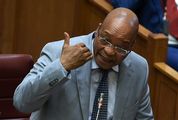THE current macroeconomic environment has complicated life for many countries in Africa. External dynamics have put pressure on commodity prices, and consequently Africa’s growth prospects. Though the external environment is largely beyond their control, African governments are deepening the crisis with frequent regulatory changes and uncertainty about policy direction.
Such domestic "own goals" are avoidable. But irrational, haphazard policy decisions in a number of countries, such as SA, Nigeria and Zambia, have left local and foreign investors confused, and business struggling to cope with an already volatile economic climate.
As Manji Cheto, senior vice-president at Teneo Intelligence, a London-based risk consultancy, notes: "During periods when the economic fundamentals are weakening, it is right that people expect government response to be measured and guided by economic pragmatism — after all, the ability to maintain market confidence becomes one of the very few things within the government’s control in these turbulent times. Unfortunately, however, precedence shows it is exactly the opposite that occurs at these times; many governments become irrational and erratic."
As a result, a firm eye is being cast on policy makers as they attempt to react to policy conundrums. Any clumsy mistakes will carry a hefty price this year, with negative sentiment towards Africa already running high.
Nowhere was this more clearly displayed than in SA, where President Jacob Zuma’s ousting of Nhlanhla Nene as finance minister triggered a collapse of the rand and equity markets.
SA’s business confidence last year hit the lowest annual average since 1993, according to the latest business confidence index of the South African Chamber of Commerce and Industry.
In Nigeria, the already challenging economic environment was aggravated by elevated levels of policy inertia.
Despite being elected in March and inaugurated two months later, President Muhammadu Buhari took over six months to appoint a cabinet. The uncertainty in the country forced many foreign portfolio investors, already risk averse, to sit on the sidelines while they awaited major appointments and clarity on policy direction.
The president’s approach to the economic crisis has not helped matters. Ironically, the current situation echoes his first stint as president during the 1980s, when oil prices had also fallen by more than half. He has again backed central bank foreign currency controls, which have led to an overvalued naira, lower imports and weaker economic growth.
Artificially supporting the currency has drawn harsh criticism from various quarters, including Charles Soludo, a former central bank governor. He noted in a speech that for the better part of last year the external shocks to the economy had been complicated by the "tried and failed" command and control policy regime: a de facto fixed exchange rate; crude capital controls; veiled forms of import bans through a long list of "ineligible for foreign exchange" items; and the de facto scrapping of domiciliary accounts established by law.
Buhari’s approach to prioritise the war against corruption and counterinsurgency has not boosted investor confidence. On the contrary, the markets have been further spooked by the ousting of Nigeria from JP Morgan’s local-currency emerging-market bond indices, which are tracked by more than $200bn of funds.
Investor perceptions of Nigeria have been strained not only by policy makers’ management of the naira and the new administration’s lack of progress on economic reform — missing budgets and cutting interest rates in the face of rising inflation have also raised eyebrows.
In addition, the recent regulatory fines (of banks and telecom operators, most notably MTN), threatened suspension of directors of a leading corporate and pronouncements on foreign exchange rules by regulators have brought heightened attention to the overall risk of the operating environment in Nigeria.
While this may appear to be in line with the general global regulatory environment, the situation in Nigeria is unique due to the absence of a fully functional government and penalties that seem incongruous with the alleged wrongdoings. Adding further confusion is the lack of co-ordination and agreement among the various regulators.
Similarly, Zambia’s macroeconomic situation and policy environment have been poorly managed, both from a fiscal and regulatory perspective, which has led to distrust between the government and the private sector.
The lack of certainty has hampered investment and growth within revenue-generating areas. In the last 24 months, the government has been in dispute with the mining sector (which represents 70% of exports, 20% of revenue and 10% of gross domestic product) over two different policy issues: the implementation of VAT rule 18 (which requires mining companies to provide import receipts from the country of final destination of the commodities to qualify for repayments); and the revision of the mining royalty tax regime. In both instances, the government has changed its initial policy decision.
In addition, the introduction of foreign exchange regulations left many confused. Legislation has again been passed to recognise the kwacha as legal tender in Zambia, which will prohibit the use of dollars in product pricing or in demands for payment of services. This is not the first time the Zambian government has put in place such monetary policy. In 2012, the statutory instrument number 33 was passed, which had the same purpose. It was, however, revoked in 2014 after popular criticism.
However, these policy mistakes are not unique to African markets. China, too, has been ineffective in calming fears about its financial markets amid speculative attacks that have ensued since the stock market crash in July, which wiped about 30% off the Shanghai Composite index.
Chinese policy makers responded to the changes with a spectacle of ever-more drastic actions to save the market. However, this response inspired little confidence. In fact, the interventions had the opposite effect and triggered a wave of panic selling, rattling local and foreign investors.
African policy makers should take note. With limited policy flexibility and exogenous shocks already affecting the growth outlook, African sovereigns can ill afford to further complicate matters with avoidable mistakes. Managing sentiment positively will be key in ensuring African economies navigate these turbulent times effectively.
To do this, policy makers need to limit "own goals" by adopting more decisive messaging and providing clear and unambiguous policy responses on key issues.
• Gopaldas is head of Country Risk at Rand Merchant Bank

Policy makers need to adopt more decisive messaging and provide clear and unambiguous policy responses on key issues, says the writer. Picture: THINKSTOCK
THE current macroeconomic environment has complicated life for many countries in Africa. External dynamics have put pressure on commodity prices, and consequently Africa’s growth prospects. Though the external environment is largely beyond their control, African governments are deepening the crisis with frequent regulatory changes and uncertainty about policy direction.
Such domestic "own goals" are avoidable. But irrational, haphazard policy decisions in a number of countries, such as SA, Nigeria and Zambia, have left local and foreign investors confused, and business struggling to cope with an already volatile economic climate.
As Manji Cheto, senior vice-president at Teneo Intelligence, a London-based risk consultancy, notes: "During periods when the economic fundamentals are weakening, it is right that people expect government response to be measured and guided by economic pragmatism — after all, the ability to maintain market confidence becomes one of the very few things within the government’s control in these turbulent times. Unfortunately, however, precedence shows it is exactly the opposite that occurs at these times; many governments become irrational and erratic."
As a result, a firm eye is being cast on policy makers as they attempt to react to policy conundrums. Any clumsy mistakes will carry a hefty price this year, with negative sentiment towards Africa already running high.
Nowhere was this more clearly displayed than in SA, where President Jacob Zuma’s ousting of Nhlanhla Nene as finance minister triggered a collapse of the rand and equity markets.
SA’s business confidence last year hit the lowest annual average since 1993, according to the latest business confidence index of the South African Chamber of Commerce and Industry.
In Nigeria, the already challenging economic environment was aggravated by elevated levels of policy inertia.
Despite being elected in March and inaugurated two months later, President Muhammadu Buhari took over six months to appoint a cabinet. The uncertainty in the country forced many foreign portfolio investors, already risk averse, to sit on the sidelines while they awaited major appointments and clarity on policy direction.
The president’s approach to the economic crisis has not helped matters. Ironically, the current situation echoes his first stint as president during the 1980s, when oil prices had also fallen by more than half. He has again backed central bank foreign currency controls, which have led to an overvalued naira, lower imports and weaker economic growth.
Artificially supporting the currency has drawn harsh criticism from various quarters, including Charles Soludo, a former central bank governor. He noted in a speech that for the better part of last year the external shocks to the economy had been complicated by the "tried and failed" command and control policy regime: a de facto fixed exchange rate; crude capital controls; veiled forms of import bans through a long list of "ineligible for foreign exchange" items; and the de facto scrapping of domiciliary accounts established by law.
Buhari’s approach to prioritise the war against corruption and counterinsurgency has not boosted investor confidence. On the contrary, the markets have been further spooked by the ousting of Nigeria from JP Morgan’s local-currency emerging-market bond indices, which are tracked by more than $200bn of funds.
Investor perceptions of Nigeria have been strained not only by policy makers’ management of the naira and the new administration’s lack of progress on economic reform — missing budgets and cutting interest rates in the face of rising inflation have also raised eyebrows.
In addition, the recent regulatory fines (of banks and telecom operators, most notably MTN), threatened suspension of directors of a leading corporate and pronouncements on foreign exchange rules by regulators have brought heightened attention to the overall risk of the operating environment in Nigeria.
While this may appear to be in line with the general global regulatory environment, the situation in Nigeria is unique due to the absence of a fully functional government and penalties that seem incongruous with the alleged wrongdoings. Adding further confusion is the lack of co-ordination and agreement among the various regulators.
Similarly, Zambia’s macroeconomic situation and policy environment have been poorly managed, both from a fiscal and regulatory perspective, which has led to distrust between the government and the private sector.
The lack of certainty has hampered investment and growth within revenue-generating areas. In the last 24 months, the government has been in dispute with the mining sector (which represents 70% of exports, 20% of revenue and 10% of gross domestic product) over two different policy issues: the implementation of VAT rule 18 (which requires mining companies to provide import receipts from the country of final destination of the commodities to qualify for repayments); and the revision of the mining royalty tax regime. In both instances, the government has changed its initial policy decision.
In addition, the introduction of foreign exchange regulations left many confused. Legislation has again been passed to recognise the kwacha as legal tender in Zambia, which will prohibit the use of dollars in product pricing or in demands for payment of services. This is not the first time the Zambian government has put in place such monetary policy. In 2012, the statutory instrument number 33 was passed, which had the same purpose. It was, however, revoked in 2014 after popular criticism.
However, these policy mistakes are not unique to African markets. China, too, has been ineffective in calming fears about its financial markets amid speculative attacks that have ensued since the stock market crash in July, which wiped about 30% off the Shanghai Composite index.
Chinese policy makers responded to the changes with a spectacle of ever-more drastic actions to save the market. However, this response inspired little confidence. In fact, the interventions had the opposite effect and triggered a wave of panic selling, rattling local and foreign investors.
African policy makers should take note. With limited policy flexibility and exogenous shocks already affecting the growth outlook, African sovereigns can ill afford to further complicate matters with avoidable mistakes. Managing sentiment positively will be key in ensuring African economies navigate these turbulent times effectively.
To do this, policy makers need to limit "own goals" by adopting more decisive messaging and providing clear and unambiguous policy responses on key issues.
• Gopaldas is head of Country Risk at Rand Merchant Bank
























Change: 0.47%
Change: 0.62%
Change: 1.01%
Change: 0.66%
Change: -0.60%
Data supplied by Profile Data
Change: 0.32%
Change: 0.90%
Change: 0.47%
Change: 0.00%
Change: 0.66%
Data supplied by Profile Data
Change: 0.95%
Change: 0.86%
Change: 0.86%
Change: 1.40%
Change: 1.17%
Data supplied by Profile Data
Change: -0.25%
Change: -0.71%
Change: 0.57%
Change: 0.00%
Change: -0.19%
Data supplied by Profile Data